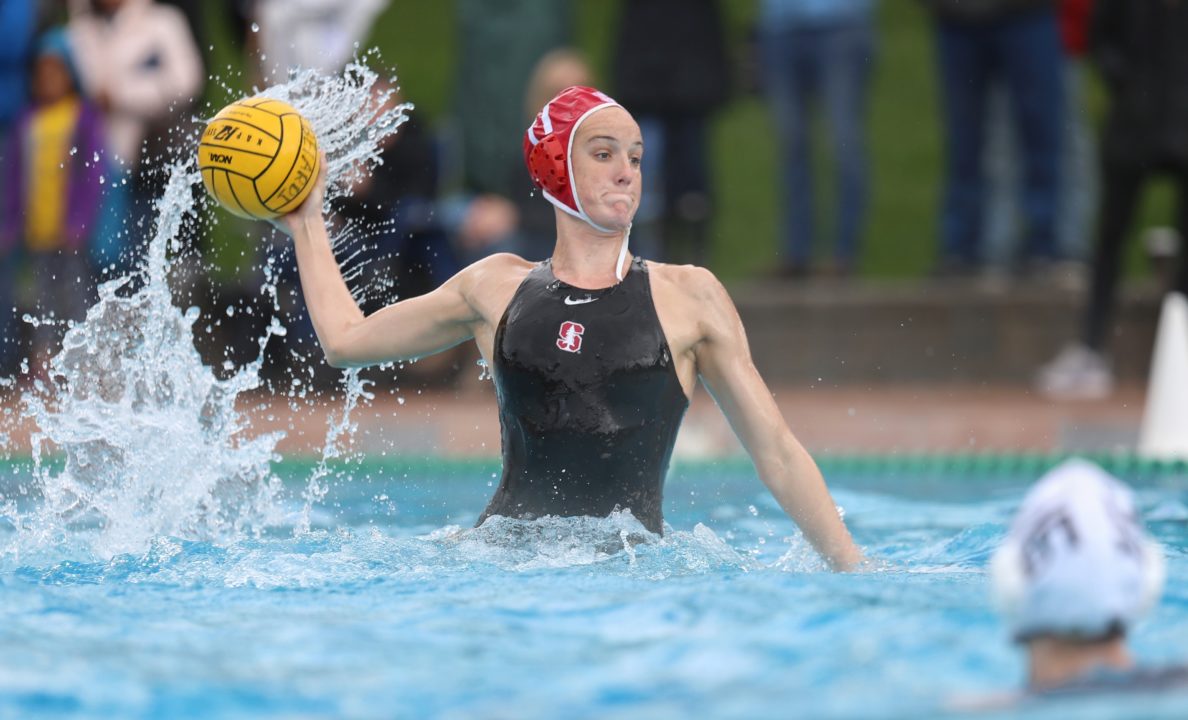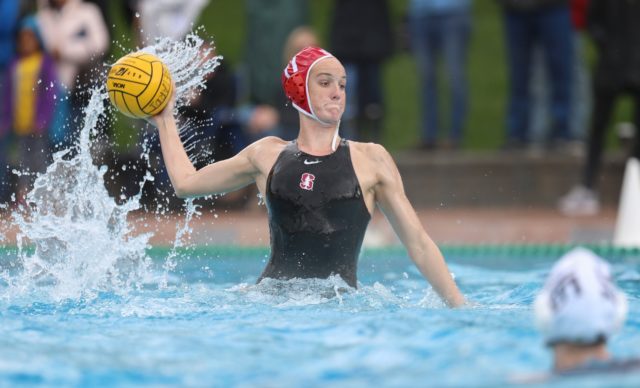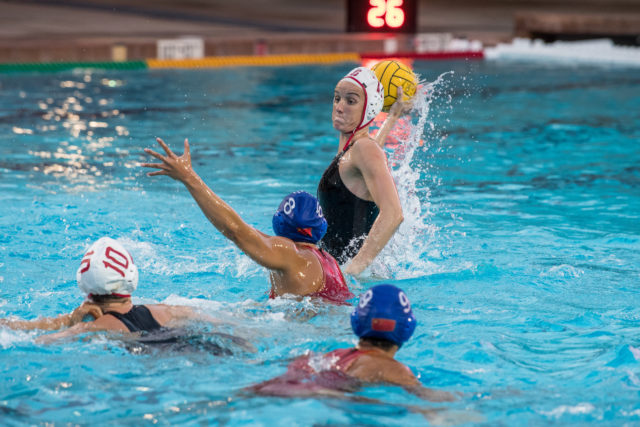Wherever Stanford’s #11 Makenzie Fischer is in the pool opposing coaches and players take notice. But, the question remains, even if they know where she is, can they stop the Cardinal’s goal scoring machine?
The answer in most cases is no as evidenced by her 4.17 goals per game average, 11 multi-score efforts and nine efforts of three goals or more.
What makes her so good? Indiana coach Ryan Castle offers this of the player who shredded his team for six goals on Feb. 2, tied for her second highest output of the season.
“Firstly, she’s the most athletic athlete I’ve ever seen in any sport; water polo is fortunate to have her.” Castle said. “Secondly, she has so much experience that the game is intuitive to her. She can recognize patterns on offense and defense a step or two faster than almost anybody. Lastly, she’s a natural competitor. In every game I’ve seen her play, she is competing throughout the pool regardless of the situation.”
Castle is not alone in his admiration for Fischer and anguish when playing against her. Michigan coach Marcelo Leonardi, who coached Makenzie at the Youth World Championships in Madrid in 2014, knew what to expect but could not keep her from racking up eight goals on Feb. 2, the most in the MPSF this year.
“Back in 2014 when she was a high school player, she was used primarily as a defensive player that had the ability to score and would guard at 2-meters. At Youth Worlds, we used her as a perimeter defender, so if she scored goals that was a plus,” Leonardi shared. “But, what she is doing this year, I am not surprised. She is incredible; she is one of the best field players in the country. I would also argue that she is the best two-way field player in the country. Her versatility, her length, her athleticism and her polo IQ put her at a whole different level.
“You have your hands full with Makenzie, not only on the perimeter – which she can play on both sides of the pool – but she can defend at the highest level and score at the highest level. She is not only matching up with other people’s elite perimeter players, but she picks them apart. She counters, she creates on the counter attack, she finishes in zones, she can beat people one on one to create other advantages and in 6-on-5, she just picks you apart.”
When asked to explain his tactics on trying to slow Fischer down, Leonardi offered this.
“We always want to put our best player on her and she will still find ways to score,” he said. “If we double team her or we try to play one on one with a small shadow or try to help off of her, other people are going to beat us. The issue is that it is kind of hard on the counter and in transition, because that is one area that she excels at. A lot of factors have to go in to slowing down somebody like Makenzie Fischer. It is not just individual defense, it is more team tactical defense, but also what you do on the offensive end. She is so explosive that she leaks out in transition and she beats you on the counter attack; you have to slow the game down as well. They (Stanford) play at a really high pace, where if you are turning the ball over, they are gone, and she is gone.
“You can only hope to contain her, that is it. She is going to get hers. Everybody else has to beat you and guess what, they do. You hope she has a day off.”
That day off seemingly never comes. Even on a slow day at the office, Fischer put in one goal against Pacific (Feb. 23) and two each against Fresno State and #1 USC (2/24).
Take a look at Fischer’s 2019 outputs, which have her tied with Kelly Eaton for 10th on the program’s all-time scoring list (171, 2007-10).
- 3 vs. #11 Long Beach State (1/26)
- 2 vs. #17 Fresno State (1/27)
- 6 vs. #14 San Jose State (1/27)
- 8 vs. #8 Michigan (2/2), most in the MPSF this season.
- 6 vs. #19 Indiana (2/2)
- 4 vs. #4 Cal (2/3)
- 6 vs. #11UC Davis (2/16)
- 4 vs. #21 Cal State Northridge (2/22)
- 1 vs. #10 Pacific (2/23)
- 5 vs. #3 UCLA (2/23)
- 2 vs. #1 USC (2/24)
- 3 at #9 Arizona State (3/9)
What Fischer is doing is not lost on her own coach John Tanner, who has been watching her play and hoping to have her on his Stanford squad since she was 10 years old.
“She was an incredible player who showed brilliance at every level and has had great coaching throughout,” Tanner said of recruiting Makenzie. “She was seen as a super star pretty early on. It isn’t like anything she is doing now is terribly surprising. She is somebody that we were looking at as soon as we saw her play at age 10.
“She is an amazing athlete and amazing woman. It was a no brainer to recruit her. She has a really good feel for the game. She has been playing for a long time at a really high level and she maintains just an eerie calm. She is a very poised player. She makes very good decisions with the ball and finds open players all of the time.”
Fischer comes by her talent naturally as her father Erich was a two-time All-American at Stanford and 1992 Olympian, and mother Leslie played club water polo at Stanford.
By 2013, Makenzie had found a spot on the Team USA squad at the FINA Women’s Junior World Championships in Greece. The following year took her to Spain as a member of the USA team at the FINA World Youth Championships. Fischer brought home gold from both events. That was just a mere taste of the golden hardware she would later earn at FINA World Championships (2015), Super Finals (2014-16) and World Cup (2018) as well as the Olympics (2016).
- Makenzie Fischer and sister Aria Fischer. Photo provided by Makenzie Fischer.
- Makenzie and Aria Fischer. Photo provided by Makenzie Fischer.
While beginning to make a name herself internationally, in the high school ranks Fischer piled up 456 career goals and led her Laguna Beach team to two CIF Southern Section Division I titles while earning CIF Division Player of the Year nods both seasons.
Fischer has shown her versatility throughout her career, first as a goal scorer as a youth and then as a defender on the international stage.
“With the national team, her reputation in the sport developed as a defensive player or defender, the position that she played at the Olympics in Rio,” Tanner said. “But, as a younger player, she was an amazing offensive talent who could play anywhere in the pool. So, it was really just that the national team said ‘hey we have a lot of amazing offensive players, why don’t you play here.’ And she was like, ‘ok fine.’ That is just her personality. She pursues excellence in everything that she does, so it is really ‘what do I need to do and what do you need me to do’ and she embraces that.
“(At Stanford) this year we have some really good young defenders who are guarding more, so she is playing on the perimeter more. At any point in any game, she can flip a switch and move into a different position. She is just eminently comfortable anywhere in the pool. Good things happen when she is in the water, whether she is scoring goals or not.”
With the Cardinal, Fischer earned second team All-American honors and second team All-MPSF honors as a rookie, racking up 54 goals, the most for a Stanford freshman since 2013 and the fifth most per game among all league players (2.08). In 2018, she upped her tally to 67 scores, fifth most in school history, with a MPSF leading 2.79 goals per game, including 11 hat tricks and 19 multi-score games in 24 matches en route to first team All-America and All-MPSF nods.
Fischer continues to make an impact in her junior year, earning three MPSF Player of the Week honors and needing just 13 more goals to put her name among the season top 10 for the season straight year. She is nearly a full goal ahead of the next best player in the MPSF, Emma Wright from Cal (3.18 per game) and ranks third nationally in goals per game behind Bucknell’s Ally Furano (4.31) and St. Francis Brooklyn’s Kelsey Snelgar (4.31).
Despite all of Fischer’s individual success, Tanner is quick to point out that his team will be successful in scoring by committee.
“The goal scoring opportunities flow out of team play,” Tanner said. “Makenzie has just done extremely well at capitalizing on those and finishing them. It doesn’t feel like our success hinges on how many goals she scores, but more on the opportunities that she herself and also her teammates create in the pool. Because if they are really able to just lock in on her and others aren’t able to defend or to score or create stress on an opponent, she is not going to have the scoring opportunities.”
Regardless of what role she plays in the pool, it is clear that Fischer’s impact will be felt presently as well as in the future iterations of the Stanford program.
“It is a wonderful position to be in to have her on our team as an athlete, as a leader and as a role model,” Tanner said. “She does so many things when she is on the bench, at practice and away from the pool that make her so valuable. I also feel like she has evolved. Talk about her growth, and so much of that comes from other women who came before her here and her having looked up to role models in our program who were here earlier and now she has become the consummate role model for future players that we hope will come here.”
The Cardinal have their sights set on another NCAA Tournament and national championship appearance after falling just short to USC in the 2018 finals.
Stanford has just one loss thus far in 2019, coming via 10-8 decision against the #1 Trojans in the championship match of the Barbara Kalbus Invitational on Feb. 24.
“They are hungry,” Leonardi pointed out. “You can tell that they (Stanford) are much, much hungrier with USC being the national champion from last year. You can tell that they are playing with a chip on their shoulders, but they are also one year smarter, one year bigger and one year faster, just one year better. Just Stanford in general is playing hungrier and that has a lot to do with both Fischers (Makenzie and sister Aria). They are getting a lot of productivity out of their freshman class as well and their returners, but you have two big time senior national team athletes that want to win a national championship.”
Stanford (12-1) is in the midst of a two-week break before returning to action on March 23 at home against Harvard. Still ahead on the schedule are Top 10 matchups with UC Irvine (March 25), USC (March 30), UCLA (April 6), Cal (April 13) as well as Top 20 foes in UC Davis and San Jose State. The MPSF Championship follows April 26-28 ahead of the NCAAs (May 10-12).
You can count on Fischer being a factor in each of those contests regardless of her position in the pool.
- Makenzie Fischer – photo courtesy Maciek Gudrymowicz/ISIPhotos.com.
- STANFORD, CA — February 14, 2019. The Stanford Cardinal women’s water polo team defeats the Chinese National Team in an exhibition 15-13 at the Avery Aquatic Center. Photo courtesy Karen Hickey, Stanford Athletics





I just watched a solid 30 minutes of her highlights – not how I expected to spend this Friday. Those coaches weren’t kidding about how good she is.
Water polo used to be a fall sport right? When did it move?